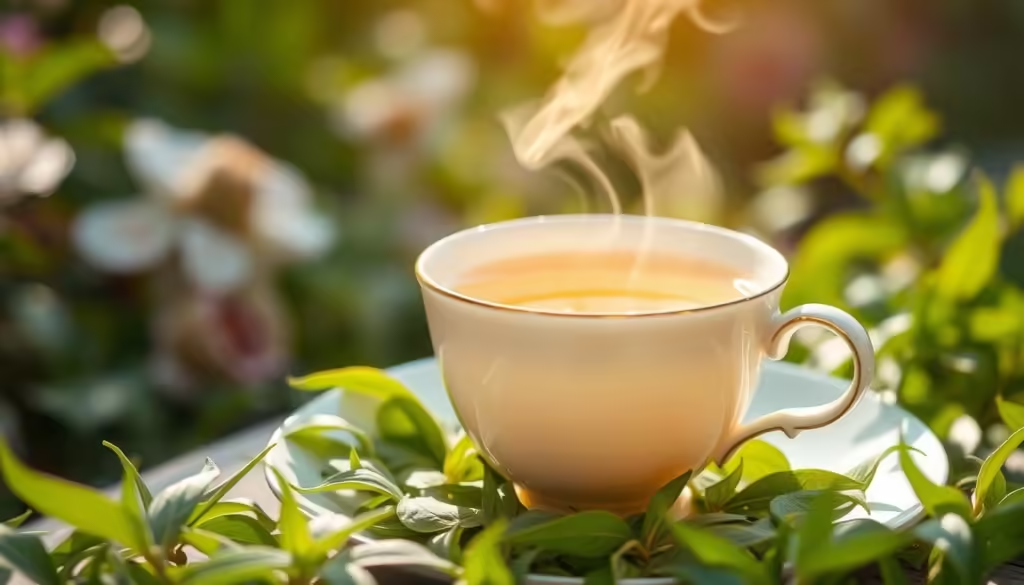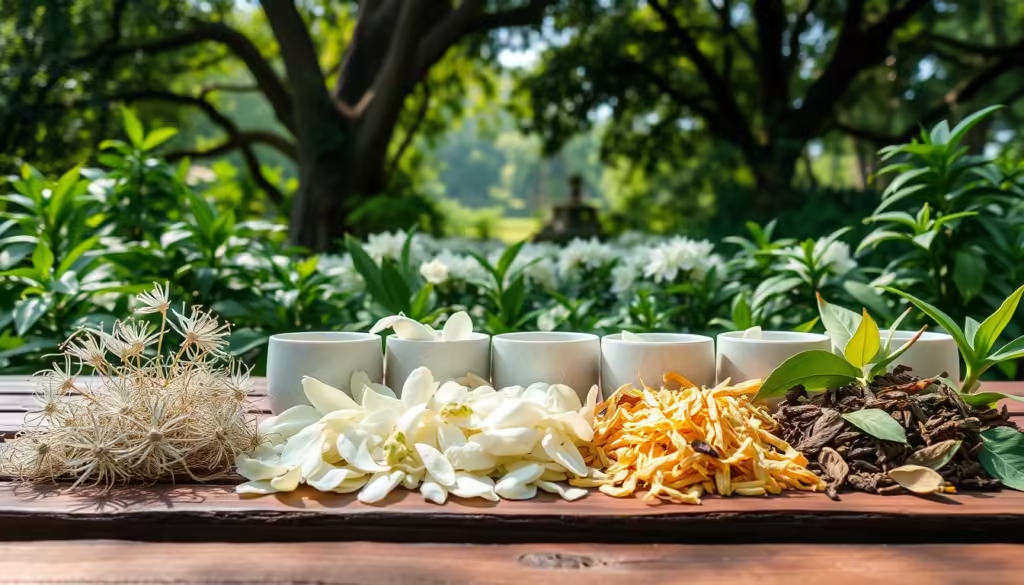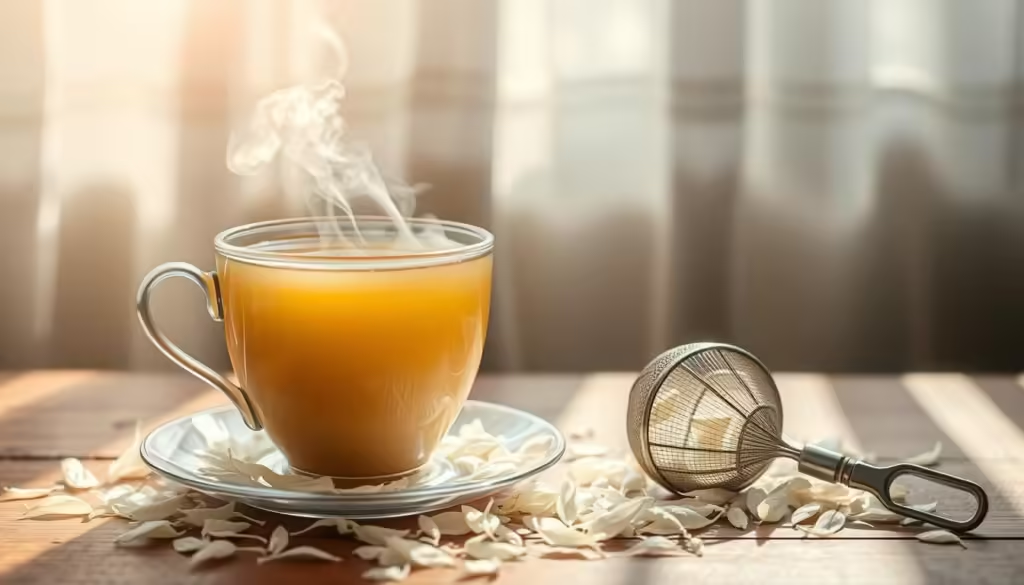
Do you love the delicate, soothing flavor of white tea but wonder about its caffeine content? You’re not alone. Many tea enthusiasts are curious to know just how much caffeine is in this popular beverage. In this article, we’ll dive into the truth about white tea and its caffeine levels, helping you make informed choices about your tea-drinking habits.
White tea, a type of minimally processed green tea, is renowned for its light, subtle taste and impressive health benefits. Unlike its bolder counterparts, black and green teas, white tea undergoes a unique production process that preserves its delicate aroma and flavor. But does this mean it’s completely caffeine-free? Let’s explore the facts.
Table of Contents
What is White Tea?

White tea comes from the Camellia sinensis plant, found in China’s Fujian province. It’s special because it’s made from young leaves and buds. These are covered in fine, silvery-white hairs, giving it a unique look and taste.
What makes white tea stand out is its minimal oxidation during processing. This keeps the leaves’ natural state. As a result, white tea is light, fragrant, and delicate. It also keeps more antioxidants and beneficial compounds than other teas.
Types of White Tea
- Bai Mu Dan (White Peony): This is one of the most popular and well-known types of white tea. It is made from the bud and the first two leaves of the tea plant.
- Shou Mei: Also known as “Noble Mountain White,” Shou Mei is made from older leaves and stems of the tea plant, producing a slightly fuller-bodied flavor.
- Gong Mei: This variety is made from larger, more mature leaves, resulting in a slightly stronger taste compared to Bai Mu Dan.
- Silver Needle (Bai Hao Yin Zhen): Considered the most premium and delicate white tea, Silver Needle is made exclusively from the young, unopened buds of the tea plant.
White Tea Processing
White tea processing is delicate and time-consuming. Leaves are hand-picked and then withered in the sun or a controlled environment. This step is key to keeping the tea’s natural aroma and flavor.
The leaves are then rolled or shaped gently. Finally, they are dried to preserve their unique characteristics. This careful process sets white tea apart from other teas.
White Tea Health Benefits
White tea is known for its health benefits. It’s packed with antioxidants and other good stuff. Research shows it may help:
- Protect against heart disease and stroke
- Reduce the risk of certain types of cancer
- Improve dental health and prevent cavities
- Support healthy skin and slow the aging process
- Enhance cognitive function and memory
- Regulate blood sugar levels and potentially lower the risk of diabetes
White tea does have caffeine, but less than other teas. This makes it a good choice for those who want to cut down on caffeine.
Does White Tea Have Caffeine?

Many people wonder if white tea has caffeine. The answer is yes, white tea does contain caffeine. It’s a type of green tea, so it has caffeine like green tea does.
But, white tea usually has about 15% less caffeine than green tea. A typical 250 ml (8 oz) cup of white tea has 6 to 55 mg of caffeine. This amount can change based on the tea type, brand, leaf size, water temperature, and steeping time.
| Tea Type | Caffeine Content (per 250 ml/8 oz cup) |
|---|---|
| White Tea | 6-55 mg |
| Green Tea | 25-40 mg |
| Black Tea | 25-48 mg |
White tea has less caffeine than green tea because it’s processed less. The young, delicate tea buds and leaves used for white tea naturally contain less caffeine than the more mature leaves used for other tea types.
If you want a tea with lower caffeine, white tea is a good option. But, remember that caffeine levels can vary. Always check the specific tea you’re drinking.
Factors Influencing Caffeine Content
Several factors affect the caffeine in white tea. Knowing these can help you make the perfect cup. This cup should match your caffeine taste.
Maturity of Tea Leaves
Tea leaf maturity is a big factor. Younger leaves have more caffeine to fight off pests. Older leaves have less caffeine.
Tea Plant Varietal
The type of tea plant also matters. Different plants naturally have more or less caffeine.
Age of the Tea
White tea’s age also affects caffeine levels. Fresh tea has more caffeine than aged tea.
Brewing Process
The brewing method changes caffeine levels too. Water temperature, steeping time, and tea leaf amount all play a part. Hotter water and longer steeping mean more caffeine.
| Factors | Impact on Caffeine in White Tea |
|---|---|
| Leaf Maturity | Younger leaves and buds have higher caffeine |
| Tea Plant Varietal | Different cultivars have varying caffeine levels |
| Tea Age | Caffeine decreases as tea ages |
| Brewing Process | Higher temp, longer steep, more leaves = more caffeine |
Understanding these factors lets you adjust brewing to control caffeine. This way, you can make a white tea that’s just right for you.
does white tea have caffeine
White tea, being a type of green tea, does have caffeine. But, it has about 15% less caffeine than regular green tea. A 250 ml cup of white tea usually has between 6 to 55 mg of caffeine. The exact amount can change based on several things.
The amount of caffeine in white tea depends on a few factors. These include the type or grade of the tea, the brand, and the serving size. The water temperature and steeping time also play a role. Plus, the tea leaves’ maturity, the plant variety, and the tea’s age can affect the caffeine levels.
White tea can have anywhere from 6 to 75 milligrams of caffeine per cup. Tea bags often have more caffeine than loose-leaf white tea. The brewing process, water temperature, and steeping time can also change the caffeine content in your cup.
